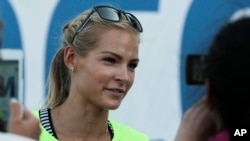The International Court of Arbitration for Sport is set to rule on the Olympic eligibility of Russian track-and-field competitor Darya Klishina, who was suspended from the Games Saturday on suspicion of doping.
Klishina, a long jumper, was the sole Russian competitor in track and field after the International Olympic Committee put a blanket ban on 68 Russian athletes implicated in a suspected doping scandal.
Klishina was originally given an exemption from the ban because she had been training in the United States for the past three years, and was not subject to Russian drug tests that have since been discredited. However, reports in Rio Saturday said new evidence had emerged implicating her in the scandal.
The International Association of Athletics Federations says Klishina has taken the case to the sports arbitration court in hopes of getting a ruling by Monday. She and her supporters say they feel the decision to exclude her from the Games is politically motivated.
Illegal doping programs
Separately, The New York Times reported Saturday it has obtained documentary evidence that illegal doping programs for sports competitors were run with state approval in the former Soviet Union, as far back as 1983. Russia was the largest republic in the former communist state, and it emerged as an independent nation following the breakup of the former communist state in 1991.
The Soviet Union boycotted the 1984 Los Angeles Olympics, but The Times said detailed preparations were underway the preceding year for an extensive doping program, focused on the USSR track-and-field team.
The newspaper said detailed instructions were sent out by government sports officials, signed by Dr. Sergei Portugalov, who today, more than 30 years later, is a central figure in Russia's current doping scandal. The World Anti-Doping Agency named Portugalov last year as a key broker of performance-enhancing drugs in Russia, "someone who in recent years injected athletes personally and made a business of covering up drug violations in exchange for money."
The Times wrote that Soviet sports officials decided "oral steroid tablets were not enough ... to ensure dominance at the Games" and that "the team should also inject its top athletes with three other kinds of anabolic steroids."
The belief was that potent drugs were critical to ensuring that Soviet athletes could keep up with the competition at the Olympics.
"Providing precise measurements and timetables for the doping regimens, the officials said they had a sufficient supply of the banned substances on hand at the Research Institute of Physical Culture and Sports in Moscow, a division of the government’s sports committee," The Times said.
Soviet documents
The newspaper reprinted a portion of an original document about the Soviet doping program, summarizing a meeting of the Soviet Union sports committee on November 24, 1983, at which "individual profiles of special pharmacological preparation" were approved for track-and-field athletes of all disciplines.
The document and other information about the Soviet doping program came from a former chief doctor for the Soviet track-and-field program, The Times said.
"The 1983 document and the account of Dr. Grigory Vorobiev, the former chief medical doctor, who spent more than three decades with the Soviet track team, provide new evidence of how far back Russia’s state-sponsored doping stretches," the newspaper said.
Klishina, the suspended Russian long jumper, wrote in a Facebook post Saturday that she is a victim of political intrigues targeting the Kremlin: "At this moment I cannot help but feel betrayed by a system that is not focused on keeping the sport clean and supporting rank-and-file athletes, but rather seeking victories outside sport arenas."
Russian news agencies reported that the country's top Olympic official said Klishina's exclusion from the Rio Games is what "appears to be cynical mockery of the Russian sportswoman by the IAAF," the International Association of Athletics Associations.
Elderly physician
Vorobiev, now 86, is long retired as a sports doctor for the Soviet Union and, through the 1990s, for Russia. He now lives in Chicago, near his son and grandchildren. The Times said he was interviewed for two days, and described a system "in which winning at any cost, without getting caught, was paramount."
The elderly physician said he advised hundreds of athletes who sought performance-enhancing drugs. He recalled that he told most of them to take as low a dose of such preparations as possible, and stressed that taking drugs was no substitute for rigorous training.
The Soviet Union withdrew from the Los Angeles Olympics five months after the confidential memorandum that The Times published. Moscow cited the "anti-Olympian actions of the U.S. authorities and organizers of the Games" and said the United States was encouraging "chauvinistic sentiments and an anti-Soviet hysteria."
Vorobiev says he never learned whether the program calling for injections of multiple steroid drugs was fully implemented, but that the Soviet state's "fixation" on beating the competition by using banned substances never ended.





